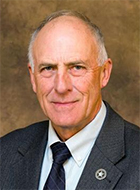
Mike Milburn, Chair, Montana
email | 406-603-4013
Mike Milburn was appointed to the Council by Governor Greg Gianforte in May 2021. Milburn is a Montana native who was raised on a family cattle ranch in central Montana. He graduated from Montana State University with a geology degree. He married his childhood sweetheart and has three children and seven grandchildren. He is a retired Air Force pilot, having served on active duty and in the Montana National Guard. He served four terms in the Montana House of Representatives, his last term as Speaker of the House. Most recently he was the Director of the Montana Department of Justice and then served on Governor Gianforte’s executive team until his appointment to the Council.
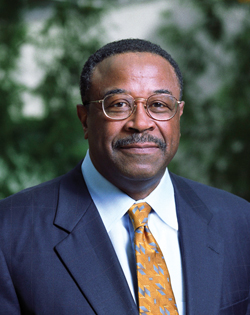
Thomas (Les) Purce, Vice-Chair, Washington
email | 360-816-1173
Dr. Purce served as president of The Evergreen State College from 2000 to 2015. Prior to that, he served as vice president of extended university affairs and dean of extended academic programs at Washington State University in Pullman, Washington. He began his career in higher education at Idaho State University as special assistant to the president. In the private sector, Purce worked as the chief operating officer of Power Engineering, Inc. based in Hailey, Idaho.
Before his extensive career in academia, Dr. Purce was active in the political arena. While in his late twenties, Purce was elected to the Pocatello City Council in 1973 and in 1976 he became Pocatello’s first black mayor.
He has also held several appointments on boards and councils, most recently as co-chair of the Southern Resident Orca Task Force.
Dr. Purce and his wife, Jane Sherman, live in Olympia, Washington. They have three adult daughters Deborah, Sarah, and Miriam.

Jeffery Allen, Idaho
email | 208-947-4080
Jeffery C. Allen was appointed to the Council in March 2019 by Idaho Governor Brad Little. Prior to his appointment, he directed the Idaho office of the Council for 10 years, where he established and continues to maintain relationships with the people and organizations in Idaho that deal with issues the Council addresses in its planning activities, including protecting and enhancing salmon, steelhead, and resident fish affected by hydropower dams, water allocation, and ensuring the Northwest has a reliable and affordable electric power system.
Before managing the Council’s Idaho office, he worked for the Governor’s Office of Species Conservation, where he advised Idaho’s effort to coordinate all state policies relating to the Endangered Species Act and led Idaho’s efforts to delist the wolf and establish a compensation fund to pay for livestock lost to wolves. Earlier, Mr. Allen served as the State Director of Natural Resources for U.S. Senator Mike Crapo. Mr. Allen holds a Bachelor’s in International Relations from Brigham Young University. He lives in Star with his wife, Annette, and four children.
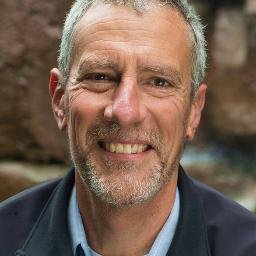
KC Golden, Washington
email | 360-816-1172
Golden was senior policy advisor at the non-profit public interest group Climate Solutions from 2002-2018. He directed Washington’s energy policy office as Assistant Director in the Department of Community Trade and Economic Development in the mid-1990s. In the late 90s, he served as special assistant to the mayor of Seattle, working on clean energy and climate protection initiatives at Seattle City Light. Prior to his public service, he was executive director of the Northwest Energy Coalition, a broad-based organization formed to represent the public interest in the implementation of the Regional Act that established the Council. He was appointed to the Council in March 2022 through January 2025.
Golden is a leader in the national climate movement, serving on the boards of Evergreen Action and 350.org. His utility experience includes helping Seattle City Light become the first major carbon-free electric utility in the late 1990s and serving on the executive board of Energy Northwest, a regional public power consortium.
Golden earned his bachelor’s degree at the University of California, Berkeley, and was a Kennedy Fellow at Harvard's Kennedy School of Government, where he received a master's in public policy. In 2012, he received the Heinz Award for achievement in public policy based on his work in Northwest energy policy.
Golden lives with his wife Kristi Skanderup in the Methow Valley of North Central Washington. His adult daughter and son live in the region and often share the family home. The Methow is like a little bit of Montana in Washington, a landscape and community distinguished more by its place in the Columbia River Basin than by state jurisdiction – a good place to think and act regionally.
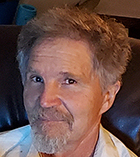
Douglas Grob, Montana
email | 406-603-4013
Doug Grob was appointed to the Council by Governor Greg Gianforte in January 2021. Grob was born, raised, and educated in Montana. An honors graduate of the University of Montana, Doug intended to attend law school, but a chance encounter ended in an offer to teach high school as a landed migrant in Australia.
Arriving in Australia, Doug was sent to Nyngan, New South Wales, as a teacher. Following that, Doug hitchhiked west from Sidney to Perth, crossing the Nullarbor Plain. Then, in central Western Australia, he worked constructing earthen dams by bulldozer on newly acquired large homestead grants.
Returning to Perth, Doug contacted a friend and fellow American, and they both bought cruise ship passage from Sidney to Auckland, New Zealand. With only 10 days to cross the 2,500 miles from Perth to Sydney, they hitchhiked back across Australia, arriving 11 hours before the ship sailed.
Arriving in Auckland, they purchased an older VW Beetle and toured both Islands of New Zealand for the next seven months with just two rules: never go faster than 45 miles per hour, and never pass any road that either of them pointed to as the way to go. They toured both islands extensively, hiked across the Southern Alps twice, and generally had a fine time until money issues forced Doug back to Australia to replenish funds. Once again in Australia, he operated heavy machinery, working on the construction of Australia’s first freeway between Sydney and Melbourne, then moved to Adelaide to work and finish saving enough money to travel to London and there decide if he would return to Australia or the United States.
He hitchhiked up the center of Australia to Darwin, spending a week at Ayers Rock and Alice Springs and another month in Darwin, where he purchased a flight to Bali, and then traveled by boat to Singapore, where he began the overland trek to London by bus, railroad, and on foot.
Reaching Bangkok, he stumbled on the filming of the Deer Hunter movie, was hired as an extra, and spent a month living on a floating hotel on the River Kwai. Leaving Thailand, he traveled to Burma (Myanmar now), India, and Pakistan. He arrived in Afghanistan the day after the Russians had toppled the Afghani Republic and was stranded in Kabul for two weeks due to the Shah having closed the border into Iran.
Once in Iran, he crossed into Turkey and then traveled from Istanbul into Europe and on to London, with a one-month hiatus in Switzerland with a Swiss friend he had met in the Hill Tribe region of Thailand.
In London, desperately trying to decide whether to return to the United States or Australia, he went to the movie “Oh, God.” The theater included a short film about St. Ignatius, Montana, and the Moise National Bison Range. Given that the Bison Range is located just 70 miles from his family farm, he figured the question of where he should return to may have been answered. Leaving the theater, he got on the London Tube, got off at the Piccadilly exit, went above ground, and purchased a ticket from London to Seattle, leaving the next morning.
Returning to the United States, he started a home-building company. Shortly thereafter, a recession caused him to enter the Alaska fishing industry. He worked in many areas of Alaska managing the design, materials management, construction labor, and building needs of the remote Alaska salmon-freezing and canning industry. After 20 years in Alaska, his last and favorite place and plant sold out to the Kodiak, Alaska, town plant, and the remote plant was closed. Doug decided to retire young, move back to Montana, and travel again.
However, before that could happen a former Montana member of the Northwest Power and Conservation Council and a former Montana Governor egged him on and convinced him to get involved in his local electric co-operative, which was in distress. He did, and this led to his extensive involvement in the Northwest power industry.
Over the next 20 years, Doug spent a good deal of time at both his utility and in Portland on regional power issues, culminating in serving on many committees and regional boards and attending many trade meetings from a broad interest in the Northwest and West Coast power industry.

Margaret Hoffmann, Oregon
email | 503-229-5171
Margaret, or Margi, Hoffmann grew up on a small family farm outside of Steamboat Springs, Colorado, a small community located in the heart of the Rocky Mountains. Hoffmann left Colorado and moved to Portland, Oregon, where she received a Bachelor of Arts in English Literature.
Hoffmann's professional career began working in natural resources management on federal lands. She has worked on public policy in the realms of public safety, health care, climate change, energy resilience and security, and land use. She has experience working for the public and private sector, as well as in non-profit management.
In 2012 and 2015, Oregon Governors John Kitzhaber and Kate Brown, respectively, appointed Hoffmann to serve as Energy Policy Advisor. In this position, Hoffmann developed the first-ever 10-Year Energy Action Plan for the State of Oregon and served as the Governor's office liaison to the Oregon Public Utility Commission and Oregon Department of Energy. After leaving the Governor's office, Hoffmann served as a senior management team member for the Farmers Conservation Alliance, a non-profit focused on modernizing irrigation infrastructure in the Western United States to benefit agricultural security and the environment. During Hoffmann's tenure, the Alliance's irrigation modernization program grew from the pilot stage to implementation across five western states and created a $1B pipeline of shovel ready irrigation modernization projects.
From 2021 to 2024, Hoffmann was appointed by President Biden to serve as the USDA Rural Development State Director for Oregon. Under Hoffmann's leadership, USDA RD Oregon invested over $1 B in loans and grants to expand broadband access, support entrepreneurs, and create access to clean water and healthcare across rural Oregon.
She currently lives in Bend with her husband, Joshua Klaus, and their daughter, Liesl.
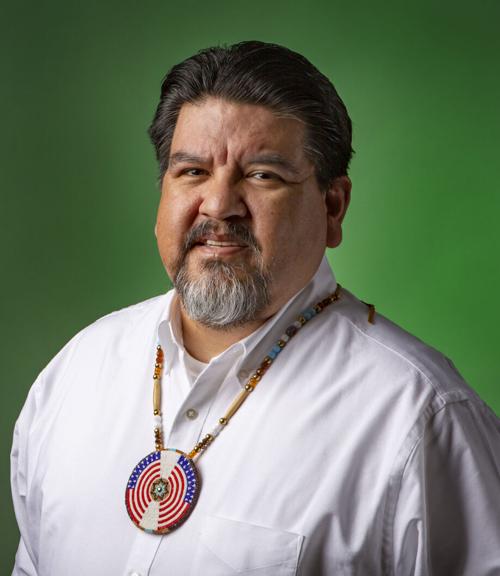
Charles F. Sams III, Oregon
email | 503-229-5171
Chuck Sams grew up on the Umatilla Indian Reservation where he is enrolled as Walla Walla and Cayuse with the Confederated Tribes of the Umatilla Indian Reservation (CTUIR). Most recently he served as the 19th director of the United States National Park Service.
Over his 35 plus years career he has served as Executive Director and Deputy Executive Director for the CTUIR, in addition to Communications Director, Environmental Health & Safety Officer and Planner and Special Sciences Analyst with the Tribes. Other prior positions include, Program Coordinator for the Community Action Program of East Central Oregon; House Manager/Field Supervisor for the City Volunteer Corps of New York; CEO/President, Vice President Programs, Northwest Director for the Earth Conservation/Salmon Corps; Executive Director of the Community Energy Project; Executive Director of the Columbia Slough Watershed Council; the National Director for the Tribal & Native Lands Program of the Trust for Public Land; Executive Director of the Umatilla Tribal Community Foundation; and President/Chief Executive Officer of the Indian Country Conservancy. He received a Master of Legal Studies in Indigenous Peoples Law from the University of Oklahoma School of Law and a Bachelor of Science degree in Business Administration, Management, Communications, and Leadership from Concordia University. He is a graduate of the U.S. Navy / Marine Corps Intelligence Training Center 'A' School and subsequently served as an intelligence Specialist with an Attack Squadron, the Joint Intelligence Center Pacific Command, and the Defense Intelligence Agency Headquarters. He and his family live in Pendleton, Oregon.
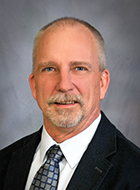
Ed Schriever, Idaho
email | 208-947-4080
Ed Schriever retired after 39-years as executive director of Idaho Fish and Game, serving from January 2019 through January 2023.
At his retirement, Schriever was the longest-serving employee in the agency, and the last 15 years of his service were in three different executive leadership positions: executive director, deputy director of field operations, and fisheries chief.
Schriever has a deep understanding of the Federal Columbia River Hydropower System and related fisheries issues. He represented Idaho in the negotiations of the northern and southern Idaho wildlife mitigation agreements with Bonneville Power Administration, and the purchase and construction of Idaho’s Springfield Snake River Sockeye Hatchery.
He represented the Western Association of Wildlife Agencies on the National Fish Habitat Partnership Board of Directors from 2008 until 2020, serving as Chairman from 2018 through 2020.
Ed has extensive experience with the wildlife side of fish and wildlife management as well, serving as co-chair of the Idaho Wolf Depredation Control Board and on the Idaho Animal Damage Control Board. He served on the board of directors of the Intermountain West Joint Venture, the Inter-agency Grizzly Bear Executive Committee, and the Greater Yellowstone Coordinating Committee. Ed also served on the board of directors and executive committee of the Western Association of Fish and Wildlife Agencies.
Ed enjoys time in the outdoors, especially hunting and fishing, and woodworking.
Also see all past and current Members terms.



